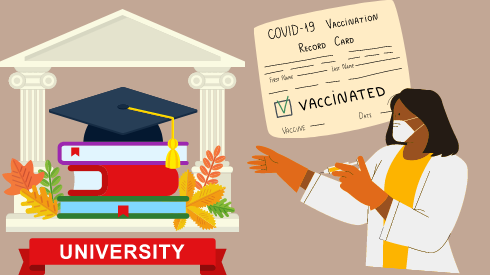VIDEO: Major university systems to require COVID-19 vaccine for fall
California community colleges decision still to come

Universities will require students, faculty and staff to get vaccinated against COVID-19 before fall 2021. Graphic by Vicky Pineda
May 14, 2021
Across the nation, a growing number of universities announced their plans to require students, faculty and staff to get vaccinated against COVID-19 before the start of the fall 2021 semester.
The California State University and the University of California systems announced on April 22 the decision to mandate the COVID-19 vaccine for the fall semester, which will impact over one million students.
Joseph Castro, CSU chancellor, called the joint effort “the most comprehensive and consequential university plan for COVID-19 vaccines in the country.”
Both systems are planning to have primarily in-person classes.
The San Diego Community College District has not issued an official decision yet.
”We strongly encourage all SDCCD students and employees who are eligible to consider getting vaccinated as a way of ensuring public health by limiting the spread of the virus,” said SDCCD in a statement posted.“In terms of requiring students and/or employees to be vaccinated, no decisions have been made.”
Dotti Cordell, who has been the Director of Student Health Services at San Diego City College, said historically, community colleges have not required vaccinations.
“Community colleges were set up to not have barriers to admissions,” Cordell said. “That has persisted my entire time at City College. Now we are in a different world of this pandemic.”
Such mandates have been a widely discussed topic across higher education, but the requirement is not new. Universities and colleges have been challenged with the legality of vaccinations and various health tests for a century.
In 1925, in the case of Wallace v. Regents of University, when a student did not have a required smallpox vaccine and sued the University of California, the judge upheld the mandate.
The UC system, like many others, already requires students to get measles, mumps and rubella; varicella (chicken pox); tetanus, diphtheria and pertussis; meningococcal vaccines, and tuberculosis screening.
These requirements are implemented to prevent the spread of contagious diseases in classrooms and dorms.
But at this point, all three coronavirus vaccines have only been granted emergency use authorization by the Food and Drug Administration, and only one, the Pfizer-BioNTech, applied for full approval earlier this month.
The vaccination requirement will be limited by medical or religious exemptions, according to the press release issued by the CSU.
“There will always have to be exceptions for people who feel, or their doctor feels, that they have medical exemptions or exceptions based on religion,” Cordell said. “The mandate would never be a 100 percent, no matter who tries to institute something.”










